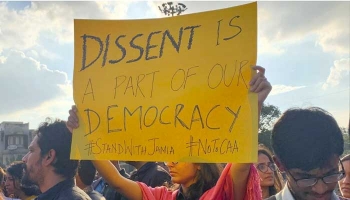
.jpg) Peter Mundackal
Peter Mundackal
.jpg)
We have seen it quite often in recent times: Some individuals, well-known and not so well known, say something that is critical of the Government in power at the centre or of the governments in States, s/he is arrested under the draconian NSA (National Security Act) or UAPA (Unlawful Activities Prevention Act – 1967); those arrested spend months or even years in the prison, and then after a rigorous trial, come out with courts indicting those who arrested them.
Cases of environment activists, journalists Vinod Dua and Siddique Kappen, comedian Munawar Faruqui, labour activists Nodeep Kaur and Shiv Kumar, Mohammed Ilyas and Mohammad Irfan (who were acquitted of UAPA related charges after nine years, seven of which they spent in jail having had four bail applications turned down) are just a few examples in this regard. Several arrested, apparently innocent, like those under the Bhima Koregaon conspiracy case, still suffer in the prison. The case of Pinjra Tod activists, Natasha Narwal and Devangana Kalita, both students at JNU, and Asif Iqbal Tanha, a student leader at the Jamia Milia Islamia, arrested under the UAPA, is too fresh in memory.
The Government’s obsession with branding those who dissent as terrorists and arresting them under UAPA is indicated by the fact that between 2016 and 2019, the number of cases filed under section 124A (Sedition) of Indian Penal Code increased by 160% while the rate of conviction dropped from 33.3% in 2016 to 3.3% in 2019, according to the National Crime Records Bureau.
Granting bail to the Pinjra Tod activists and the JMU student attracted unusual media attention primarily due to the tricks played by the police to prevent or somehow delay their release on bail, unwittingly bestowing the appellants with some heroic status. The three were arrested in May 2020 for protesting against CAA and their alleged role in the North East Delhi riots. For 13 months, they were in Delhi’s congested Tihar jail, housing a number of Covid cases. While Natasha and Devangana were in jail, Tanha was on a two-week interim custody bail to appear for University examinations. In between, Natasha was out for a short while to attend the funeral rites of her father, Mr Narwal, himself an activist and a member of the Communist party. Incidentally, a day after her release, Devangana could celebrate her birthday on 18 June, with her dear and near ones.
A Division bench of the Delhi High Court, consisting of Justices Sidharth Mridul and Anupam Jairam Bambani, came down heavily on the Delhi Police and cautioned against the tendency of “foisting” extremely grave and serious provisions of the stringent Unlawful Activities (Prevention) Act “frivolously upon the people” and that “wanton use of serious penal provisions would only trivialise them”. Ending the year-long detention of the three students, the High Court granted them bail on 15 June. In the order, the Judges said: “It seems that in its anxiety to suppress dissent, in the mind of the State, the line between the constitutionally guaranteed right to protest and terrorist activity seems to be getting somewhat blurred. If this mindset gains traction, it would be a sad day for democracy”.
Referring to the argument of the Delhi Police about the ‘threats’ implied in Sections 15 and 18 of the UAPA, the Judges stated: “Having given our anxious consideration to this aspect of ‘likelihood’ of threat and terror, we are of the view that the foundations of our nation stand on surer footing than to be likely to be shaken by a protest, however vicious, organized by a tribe of students or other persons, operating as a co-ordination committee from the confines of a University situated in the heart of Delhi”. Strong words, indeed!
The Court also underlined the right to protest and its legitimacy in a democracy. “Protests against Governmental and Parliamentary actions are legitimate; and though such protests are expected to be peaceful and non-violent, it is not uncommon for protesters to push the limits permissible in law”. The Court frowned upon the Special Court for denying bail to the appellant (Narwal) by “proceeding to accept the allegations contained in the subject chargesheet without any analysis or appreciation of the gravamen of the offences alleged…….”
The court also stressed that the Delhi Police’s chargesheet failed the UAPA test, and stated that “there is absolutely nothing in the subject chargesheet by way of any specific or particularised allegation that would show the possible commission of a ‘terrorist act’ within the meaning of section 15 of UAPA, or an act of ‘raising funds”.
Writing in the Indian Express (‘Opening the UAPA Black Box’, IE 18/6/21), the well-known public intellectual, Pratap Bhanu Mehta, who had to leave the Ashoka University because of his critical views of the present government, states: “The order is an indictment of the Delhi Police and its masters in the Ministry of Home Affairs. In any civilised democracy, heads would have rolled…..”
Similarly, Arghya Sengupta, Research Director, Vidhi Centre for Legal Policy (‘Judgement on All of Us’, The Times of India 17/6/21), says: “Any self-respecting police force in the country ought to read the judgement carefully. Pressing cavalier charges against protesting students only trivialises terrorism”. He concludes the article with the following exhortation, which is a befitting conclusion to this article:
“The Delhi HC judgement is an invitation for us to find our higher selves, for lawyers to give advice without fear or favour, for policemen to follow the rulebook, for governments to disagree with its dissidents without imprisoning them, for citizens to not remain indifferent to injustice meted out to others. It is only then that the opinion of the Delhi HC judges that ‘foundations of our nation stand on surer footing than to be likely to be shaken by protest’, will ring truer than it seems today.
(The writer is a Development Consultant and can be reached at ‘petermundackal@yahoo.com)